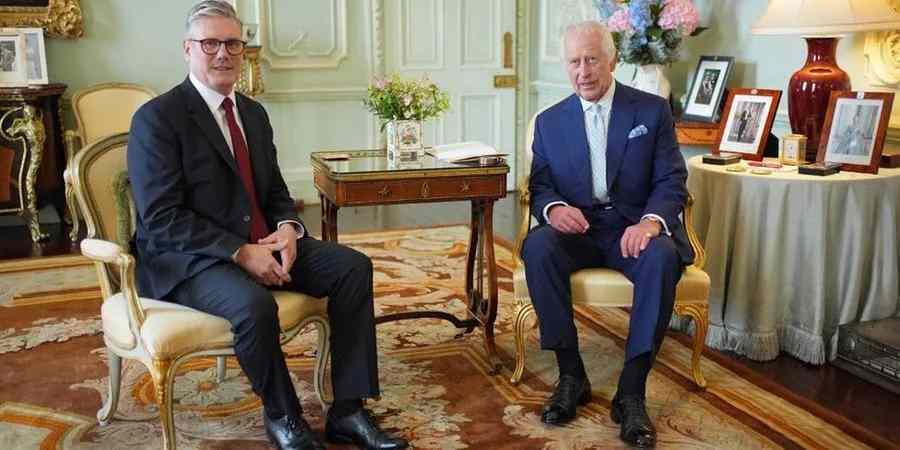
The article below was written by a Brazilian resident in London, who preferred to remain anonymous.
UK election: The dark rise of Keir Starmer
Labour won 33.9% of the popular vote and will control 65% of parliament
There is no reason to celebrate Keir Starmer’s obscure rise to power. A political trajectory built on fraud, virulent and strategically calculated smears, purging and relentless persecution of progressive forces within the Labour Party, alliances with corporate capital and, most seriously, on an unconditional ideological alliance with Zionism and with financial support from the Zionist elites.
The great paradox of the election result
Keir Starmer, despite having a 57% disapproval rating from the electorate, paradoxically achieved a landslide victory for Labour, with 410 seats so far, or almost 2/3 of parliament.
In his constituency, Holborn & St Pancras, Starmer lost 17% of his votes compared to his last election. In 2017, he had accumulated more than 41,000 votes and today he has obtained just over 18,000. In contrast, Starmer’s opposition candidate, Andrew Finkelstein, an anti-Zionist Jew and former MP in South Africa under Mandela, in six weeks of campaigning for the Workers Party of Britain, obtained 19% of the vote.
But how can we explain how an unpopular, charismatic figure who openly endorses the genocide in Palestine, to which the British population fiercely disagrees, achieves such a landslide victory?
This is partly due to the British electoral system of indirect elections for the head of government and the so-called “first past the post”. In the United Kingdom, elections for Prime Minister are indirect. The Head of State (King) appoints the Head of Government (Prime Minister), who is the leader of the party with the most seats in parliament. Voters only elect, through direct voting, MPs.
The number of seats in parliament has little relation to the number of popular votes. This is due to the district system of elections. Each voter can only vote for one member of parliament in his or her district. Each party has only one candidate per district. Thus, a candidate who receives a lot of votes but loses the election does not have his or her vote returned to the party. These votes are lost and are not expressed in seats. Similarly, a candidate who is very popular nationwide can only be voted for by residents of his or her district.
In this election, Labour won only 33.9% of the popular vote, but will control 65% of parliament. The Conservative Party, with 23.6% of the popular vote, will have 119 seats in parliament.
The Liberal Democrats will have 71 seats with just 12.1% of the popular vote, while the far-right party (Reform UK), with 14.3% of the popular vote, will have just 4 seats.
The Green Party, with 6.8% of the popular vote, Reform UK, with 14.3% of the popular vote, and Plaid Cymru, with 0.7%, will all have the same number of seats in parliament, 4.
The Labour campaign seems to have managed to exploit this feature of the electoral system with great strategy, although not always with legitimate methods, and sometimes with criminal ones. For example, by attacking and defaming specific candidates seen as a threat, such as George Galloway in the Rochdale district. As reported by Double Down News, by removing anti-gun candidates from the party itself without warning and at the last minute, and replacing them with candidates associated with corporations accused of fraud and with huge campaign funding (see also here).
This tactic by Keir Starmer is, in reality, the continuation of a very successful strategy that led him to rise to the leadership of the Labour Party through an internal coup, which purged Jeremy Corbyn and the progressive wing of the party, accusing them of anti-Semitism. This rise, supported by the Zionist lobby and corporate interests (there are even suspicions of the involvement of the secret services), was extensively denounced in the Al Jazeera documentary, The Labour Files, ignored by the British press. It is “an investigation based on the biggest leak of documents in British political history (…) that examined thousands of internal documents, emails and social media messages to reveal how senior officials (Keir Starmer) of one of the two parties in the UK government carried out a coup d’état against the elected leader of the party (Jeremy Corbyn). The documentary shows how officials began silencing, excluding and expelling their own members in a relentless campaign to destroy Jeremy Corbyn’s chances of becoming Britain’s prime minister under the guise of anti-Semitism. Candidates for key political positions were blocked and constituency groups were suspended as the party’s central office sought to control the elected leadership.
As Declassified UK’s renowned investigative journalism has revealed, two-fifths of Keir Starmer’s cabinet were heavily funded by pro-Israel lobbies. Not only that, Starmer and members of his cabinet received thousands of pounds in “gifts,” often as a gateway for lobbies to gain access to candidates and then seal more lucrative deals.
Starmer and his cabinet openly support the genocide in Gaza. David Lammy, a black MP and right-hand man, supports racist apartheid, declaring during the recent attack on Rafah, where dozens of civilians were burned to death, that “there was a legal justification for Israel to carry out this attack.”
David Lammy is just one example of Starmer’s cabinet explicitly supporting what legal consensus amounts to, at the very least, a war crime.
Another revelation from Declassified UK was Starmer’s involvement in covering up Israel’s war crimes through the abuse of power in his office. “In October 2011, Keir Starmer was asked by a human rights group and a law firm to issue an arrest warrant for former Israeli Foreign Minister Tzipi Livni, who was visiting London, for alleged war crimes. At the time, Starmer was Director of Public Prosecutions (DPP) at the Crown Prosecution Service (CPS). But two days later, he blocked the request for Livni’s arrest, citing a decision by the Foreign Office to grant her visit ‘special mission’ status.”
Another factor that explains Labour’s catapulting victory is the immense rejection that the Conservative Party has accumulated over 14 years of legislative vandalism, deregulation, marginalization of international agreements, austerity policies and fierce policies of criminalization of immigration made possible by a Taliban-like implementation of Brexit. The United Kingdom, free from the constitutional shackles of Europe, implemented Brexit in continuous violation of fundamental rights and the Peace Agreements with Northern Ireland.
Ministers such as Suella Braveman and Priti Patel, both daughters of Asian immigrants, have campaigned for the repeal of the Human Rights Act from British law and introduced legislation criminalising journalists and activists to an extent that would be envied by Egypt’s dictator El Sisi, infamous for his persecution of journalists.
Suella Braveman said it was “her dream and obsession to send asylum seekers on a plane to Rwanda”, but the European Court of Human Rights and activists intervened as the flight carrying war victims from Afghanistan and other countries was about to take off from Heathrow Airport.
The far-right wing of the Conservative Party, the Taliban of Brexit and British supremacy in the world, ended up becoming a counterproductive factor by generating two other phenomena: the more moderate Conservative voters migrated to the Liberal Democrats and independent parties, and the hard-liners they created found a new home: the far-right Reform UK Party, which decisively fragmented the Conservative vote and used unproven allegations of Russian intervention in the campaign to win votes. Paradoxically, this was one of the arguments used by the Conservatives themselves in a post-Brexit parliamentary inquiry, and by the Democrats in the United States, the infamous Russiagate that had to be debunked.
Assuming that the election result is an expression of a free election in the United Kingdom is the wrong assumption for analyzing the results. The co-optation of the British electoral process by non-transparent funding, associated with the disinformation machine and the extermination of candidates, is the starting point for understanding the results. These factors determine, if not co-opt, the British electoral process, which is affected by the economic consequences of Brexit, sanctions against Russia and a militarized state. £12.00 per minute is spent in the United Kingdom to finance the arms industry, but it is foreigners who need to be deported and the “fanfare” of the welfare state is suppressed.
There is no reason to celebrate Keir Starmer’s obscure rise to power.
Source: https://www.ocafezinho.com/2024/07/06/eleicoes-no-reino-unido-a-obscura-ascensao-de-keir-starmer/

